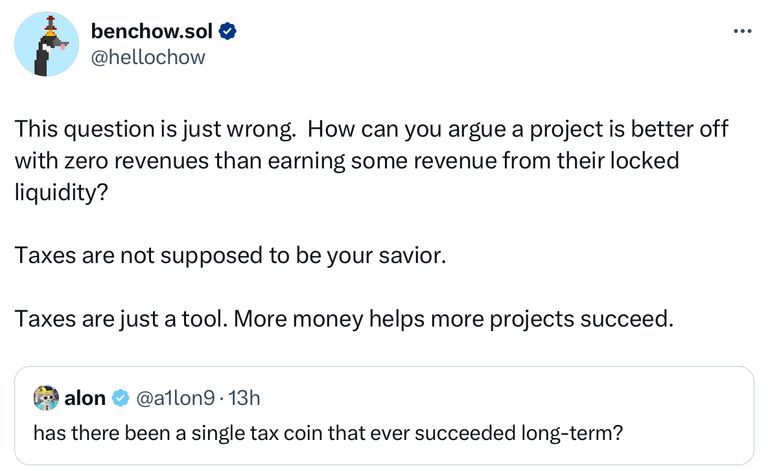
What is the most important factor to be successful token?
In the ever-evolving world of decentralized finance (DeFi), the debate over protocol fees, often referred to as "taxes," continues to spark discussion among developers, investors, and users alike. A recent exchange on social media between a skeptic and hellochow, the founder of Meteora (a rising DeFi project on Solana), sheds light on this contentious topic.
The Age-Old Question
The conversation began with a pointed question:
"Has there been a single tax coin that ever succeeded long-term?"
This query encapsulates a common skepticism in the crypto community towards projects that implement transaction fees or "taxes" on their tokens.
A Fresh Perspective
hellochow's response challenges this skepticism, offering a nuanced view on the role of protocol fees in DeFi:
Questioning the Premise: He argues that the initial question is fundamentally flawed, suggesting it's misguided to assume a project is better off with zero revenue than earning some from locked liquidity.
Fees as a Tool, Not a Savior: hellochow emphasizes that taxes (or fees) should not be viewed as a project's primary means of success. Instead, they are just one tool in a project's arsenal.
The Value of Revenue: The core of his argument is simple yet powerful: "More money helps more projects succeed."
Implications for DeFi Projects and Investors
This exchange highlights several key points for both DeFi project teams and investors to consider:
Sustainable Tokenomics: Well-designed protocol fees can contribute to a project's long-term sustainability by providing a consistent revenue stream.
Balancing Act: Projects must carefully balance fee implementation with user experience and competitiveness in the market.
Beyond Binary Thinking: The success or failure of a DeFi project isn't solely determined by the presence or absence of fees, but rather by how those fees are utilized and integrated into the overall tokenomics.
Investor Perspective: For investors, understanding a project's fee structure and how it contributes to sustainability can be crucial in evaluating long-term potential.
The Broader Context
This debate is part of a larger conversation in the DeFi space about creating sustainable economic models. As the industry matures, there's growing recognition that projects need reliable revenue sources to fund ongoing development, security measures, and community initiatives.
Wrap-Up
While the debate over protocol fees in DeFi is far from settled, hellochow's perspective offers a pragmatic view: fees, when implemented thoughtfully, can be a valuable tool for project sustainability. As the DeFi landscape continues to evolve, it's likely we'll see more nuanced approaches to tokenomics that balance the need for revenue with user incentives and market competitiveness.
For investors and users in the DeFi space, this conversation serves as a reminder to look beyond surface-level features and consider the long-term economic viability of projects. In the end, the success of a "tax coin" or any DeFi project may depend less on the presence of fees and more on how those fees contribute to the overall health and growth of the ecosystem.